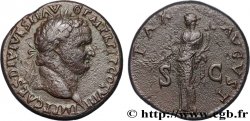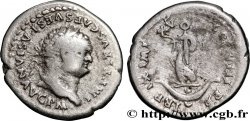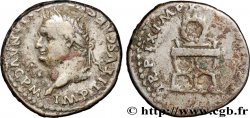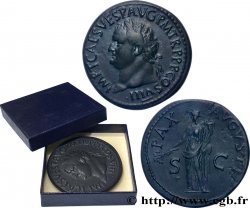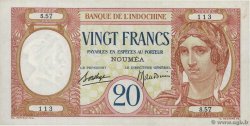E-auction 372-284881 - brm_588849 - TITUS Quinaire
You must signin and be an approved bidder to bid, LOGIN TO BID. Accounts are subject to approval and the approval process takes place within 48 hours. Do not wait until the day a sale closes to register. Clicking on « bid » constitutes acceptance of the terms of use of cgb.fr private e-auctions.
Bids must be placed in whole Euro amounts only. The sale will start closing at the time stated on the item description; any bids received at the site after the closing time will not be executed. Transmission times may vary and bids could be rejected if you wait until the last second. For further information ckeck the E-auctions F.A.Q.
NO BUYER'S FEE.
NO BUYER'S FEE.
| Estimate : | 100 € |
| Price : | 43 € |
| Maximum bid : | 70 € |
| End of the sale : | 01 June 2020 14:42:30 |
| bidders : | 7 bidders |
Type : Quinaire
Date: 75
Mint name / Town : Roma
Metal : silver
Diameter : 15 mm
Orientation dies : 6 h.
Weight : 1,40 g.
Rarity : R2
Coments on the condition:
Exemplaire sur un petit flan à l’usure très importante lisible et identifiable
Predigree :
Cet exemplaire provient de la collection P. C
Obverse
Obverse legend : T CAESAR IMP VESPASIAN.
Obverse description : Tête laurée de Titus à droite (O*).
Obverse translation : “Titus Cæsar Imperator Vespasianus Consul sextum”, (Titus césar empereur Vespasien consul pour la sixième fois).
Reverse
Reverse legend : VICTORIA - AVGVST.
Reverse description : Victoria (la Victoire) drapée marchant à droite, tenant une couronne de la main droite et une palme de la main gauche.
Reverse translation : “Victoria Augusti”, (La Victoire de l’auguste).








 Report a mistake
Report a mistake Print the page
Print the page Share my selection
Share my selection Ask a question
Ask a question Consign / sell
Consign / sell
 Full data
Full data